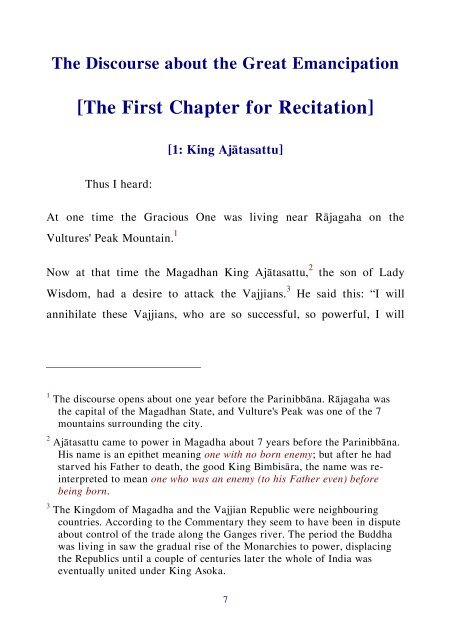The Discourse about the Great Emancipation
An English translation of one of the longest discourses in the canon, detailing the last year of the Buddha’s life, and his final teachings (Mahāparinibbānasuttaṁ, DN 16)
An English translation of one of the longest discourses in the canon, detailing the last year of the Buddha’s life, and his final teachings (Mahāparinibbānasuttaṁ, DN 16)
Create successful ePaper yourself
Turn your PDF publications into a flip-book with our unique Google optimized e-Paper software.
<strong>The</strong> <strong>Discourse</strong> <strong>about</strong> <strong>the</strong> <strong>Great</strong> <strong>Emancipation</strong><br />
[<strong>The</strong> First Chapter for Recitation]<br />
[1: King Ajātasattu]<br />
Thus I heard:<br />
At one time <strong>the</strong> Gracious One was living near Rājagaha on <strong>the</strong><br />
Vultures' Peak Mountain. 1<br />
Now at that time <strong>the</strong> Magadhan King Ajātasattu, 2 <strong>the</strong> son of Lady<br />
Wisdom, had a desire to attack <strong>the</strong> Vajjians. 3 He said this: “I will<br />
annihilate <strong>the</strong>se Vajjians, who are so successful, so powerful, I will<br />
1 <strong>The</strong> discourse opens <strong>about</strong> one year before <strong>the</strong> Parinibbāna. Rājagaha was<br />
<strong>the</strong> capital of <strong>the</strong> Magadhan State, and Vulture's Peak was one of <strong>the</strong> 7<br />
mountains surrounding <strong>the</strong> city.<br />
2 Ajātasattu came to power in Magadha <strong>about</strong> 7 years before <strong>the</strong> Parinibbāna.<br />
His name is an epi<strong>the</strong>t meaning one with no born enemy; but after he had<br />
starved his Fa<strong>the</strong>r to death, <strong>the</strong> good King Bimbisāra, <strong>the</strong> name was reinterpreted<br />
to mean one who was an enemy (to his Fa<strong>the</strong>r even) before<br />
being born.<br />
3 <strong>The</strong> Kingdom of Magadha and <strong>the</strong> Vajjian Republic were neighbouring<br />
countries. According to <strong>the</strong> Commentary <strong>the</strong>y seem to have been in dispute<br />
<strong>about</strong> control of <strong>the</strong> trade along <strong>the</strong> Ganges river. <strong>The</strong> period <strong>the</strong> Buddha<br />
was living in saw <strong>the</strong> gradual rise of <strong>the</strong> Monarchies to power, displacing<br />
<strong>the</strong> Republics until a couple of centuries later <strong>the</strong> whole of India was<br />
eventually united under King Asoka.<br />
7


















